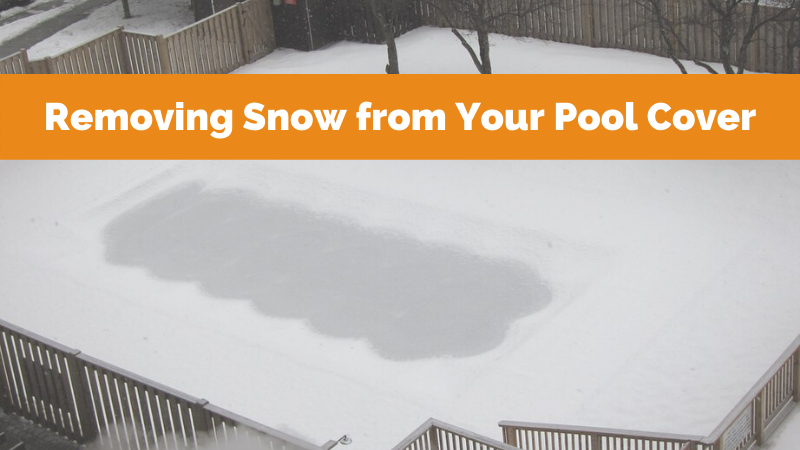
When you’ve made an investment in creating your own backyard oasis, it’s important to take care of it all year long. One important way to do so is by removing snow from your pool cover during the winter season.
What Happens to Ice and Snow on a Pool Cover?
If you own an above-ground swimming pool, you might be surprised to know that your main concern isn’t that snow might damage your pool cover. As mentioned above, it’s the weight of the snow that’s concerning. It can cause your cover to sag in the middle, creating pressure. The pressure from the sagging can cause the cover to pull on your pool walls, potentially damaging the top rail, fence and walls of your swimming pool.
Worst case scenario: your pool could collapse in on itself! That’s an extreme situation, but a possible one we want to help you avoid.
Why Remove Snow from an Above-Ground Swimming Pool Cover
If you own an above-ground swimming pool, you might be surprised to know that your main concern isn’t that snow might damage your pool cover. As mentioned above, it’s the weight of the snow that’s concerning. It can cause your cover to sag in the middle, creating pressure. The pressure from the sagging can cause the cover to pull on your pool walls, potentially damaging the top rail, fence and walls of your swimming pool.
Worst case scenario: your pool could collapse in on itself! That’s an extreme situation, but a possible one we want to help you avoid.
Why Remove Snow from an In-Ground Swimming Pool Cover
For owners of an in-ground swimming pool, the issue is a little bit different. Heavy snow can stretch and damage the cover, but you generally don’t have to be concerned until there’s two feet of snow or more on your cover.
That said, more inexpensive plastic covers damage more quickly and more easily than expensive mesh or solid safety covers. But even the more expensive covers can be damaged by heavy snow, which can cause the cover anchors to pop out, rip the cover, and more.
Can an Automatic Pool Cover Handle Snow?
Automatic pool covers are great for preventing kids and pets from getting into your pool when no one’s around. But they’re not specifically designed for winter. Instead, we’d recommend retracting your automatic pool cover during the winter months and using a mesh or solid safety cover specifically designed for winter use.
How Do I Get the Snow Off?
Remember the old adage “a stitch in time saves nine?” That idea applies to removing snow from your pool cover, too. The deeper and heavier the snow gets, the harder it is to remove. If you tackle less snow earlier, you avoid a situation where the snow is too difficult to remove. Here are a few ways you can remove the snow from your pool cover:
- For light snow, use a vacuum pole with a brush attachment to reach the middle of the pool or use your leaf blower to blow the snow away.
- For more accumulation, you’ll want to use a long-handled broom.
- A cover pump will remove water caused by melting snow. (We suggest using an electric pool cover pump with an automatic shut off.)
- Never use anything with sharp edges, like a shovel. (A plastic shovel, with smooth edges, can be helpful along with a long-handled broom.)
What if I Have Trouble Removing the Snow?
With an above-ground pool, if you already have a lot of snow accumulation on your pool cover it can be difficult to remove, even using a long-handled broom.
If you’re unable to reach and remove all of the snow (NEVER walk on your pool cover to try to remove snow or ice), your best bet is to cut the cable to your pool cover. You read that right! Yes, you’ll have more clean-up to face in the spring. But at least you’ll still have an intact pool!
As the snow begins to fall, please contact us if you have any questions about removing snow from your pool cover. Our professionally trained staff will be happy to provide advice based on your particular situation. You can also stop in to any of our 4 locations or request a quote online today, if you’re thinking about installing a pool for next summer.